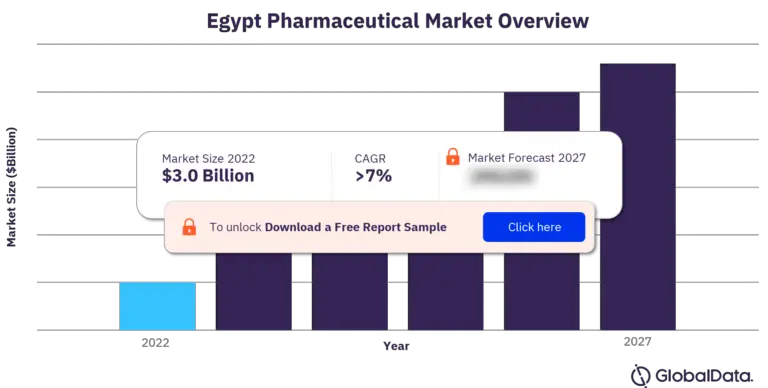Egypt's pharmaceutical industry is undergoing a transformative period marked by significant growth and innovation. Egypt Pharmaceutical Market The rise of local production and the increasing prevalence of generic medications are reshaping the landscape, making healthcare more accessible and affordable for millions. This article explores the factors driving this boom, the benefits of local production, and the future prospects for generics in Egypt's pharmaceutical sector.
The Growth of Egypt's Pharmaceutical Market
Egypt's pharmaceutical market has been expanding rapidly, driven by several key factors:
1. Increasing Population and Healthcare Demand
With a population exceeding 100 million, Egypt has a substantial and growing demand for healthcare services and products. The rising prevalence of chronic diseases and an increasing awareness of health and wellness further fuel this demand.
2. Government Initiatives and Policies
The Egyptian government has implemented various policies to support and promote local pharmaceutical production. These include financial incentives, regulatory reforms, and efforts to streamline the approval process for new medications. Such initiatives aim to reduce dependency on imported drugs and bolster the domestic pharmaceutical industry.
3. Investment in Research and Development
Local pharmaceutical companies are investing heavily in research and development (R&D) to enhance their product offerings. This investment is critical for producing high-quality generics that can compete with international brands.
The Rise of Local Production
Local production of pharmaceuticals in Egypt has seen substantial growth due to several advantages:
1. Cost Efficiency
Producing medications locally reduces costs associated with importing raw materials and finished products. This cost efficiency is passed on to consumers, making medications more affordable.
2. Supply Chain Stability
Local production enhances the stability and reliability of the pharmaceutical supply chain. It reduces the risk of disruptions caused by international trade issues, ensuring a steady supply of essential medications.
3. Job Creation and Economic Growth
The expansion of local pharmaceutical manufacturing creates job opportunities and contributes to economic growth. It supports ancillary industries such as packaging, logistics, and raw material suppliers.
4. Quality Control
Local production allows for stricter quality control measures, ensuring that medications meet stringent standards. This focus on quality builds trust among healthcare providers and patients. For more insights on Egypt pharmaceutical market forecast, download a free report sample
The Emergence of Generics
Generic medications, which are bioequivalent to brand-name drugs but typically sold at lower prices, are gaining popularity in Egypt for several reasons:
1. Affordability
Generics offer a cost-effective alternative to expensive brand-name medications, making them accessible to a broader segment of the population. This affordability is crucial in a country where healthcare costs can be a significant burden.
2. Therapeutic Equivalence
Generics provide the same therapeutic benefits as their brand-name counterparts. They are rigorously tested to ensure they meet the same standards of efficacy, safety, and quality.
3. Patent Expirations
As patents on many blockbuster drugs expire, opportunities arise for local manufacturers to produce and market generic versions. This trend is expected to continue, further boosting the availability of generics.
4. Regulatory Support
The Egyptian Drug Authority (EDA) has been supportive of the generics market, implementing regulations that facilitate the approval and production of generic medications. This regulatory environment encourages innovation and competition among local manufacturers.
Success Stories in Local Production and Generics
Several Egyptian pharmaceutical companies have made significant strides in local production and generics:
1. Pharco Pharmaceuticals
Pharco is one of Egypt’s leading pharmaceutical companies, known for its extensive portfolio of generic medications. The company’s commitment to R&D and quality has positioned it as a key player in the local market.
2. EIPICO (Egyptian International Pharmaceutical Industries Company)
EIPICO has a strong focus on producing a wide range of generic drugs. Its investment in state-of-the-art manufacturing facilities and adherence to international quality standards have made it a trusted name in the industry.
3. Ibnsina Pharma
Ibnsina Pharma, a major pharmaceutical distributor, has played a vital role in ensuring the widespread availability of both locally produced and generic medications across Egypt. Its robust distribution network supports the rapid growth of the pharmaceutical market.
The Future of Egypt’s Pharmaceutical Industry
The future looks promising for Egypt's pharmaceutical industry, particularly in the areas of local production and generics:
1. Expansion into Export Markets
With a solid foundation in local production, Egyptian pharmaceutical companies are poised to expand into regional and international markets. This expansion will enhance their global competitiveness and contribute to economic growth.
2. Innovation and Biologics
The industry is expected to see increased investment in innovative therapies and biologics. Local companies are likely to collaborate with international partners to bring cutting-edge treatments to the Egyptian market.
3. Digital Transformation
The adoption of digital technologies, such as telemedicine and e-prescriptions, will streamline operations and improve patient access to medications. Digital transformation will also enhance data analytics capabilities, supporting more efficient production and distribution processes.
4. Sustainability Initiatives
Environmental sustainability is becoming a priority for pharmaceutical companies worldwide. Egyptian manufacturers are likely to adopt greener practices and sustainable production methods, aligning with global trends and regulatory requirements.
Conclusion
The rise of local production and generics in Egypt's pharmaceutical landscape marks a significant step towards improving healthcare accessibility and affordability. Supported by government initiatives, investment in R&D, and a focus on quality, the industry is well-positioned for continued growth. As Egypt strengthens its domestic pharmaceutical capabilities, it not only meets the needs of its population but also sets the stage for becoming a key player in the global pharmaceutical market.





